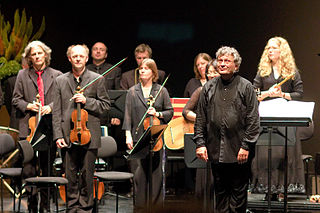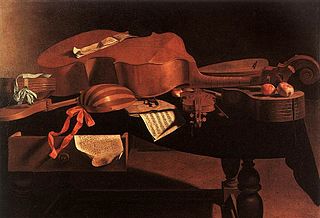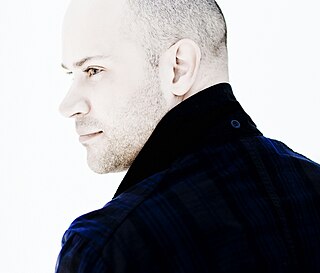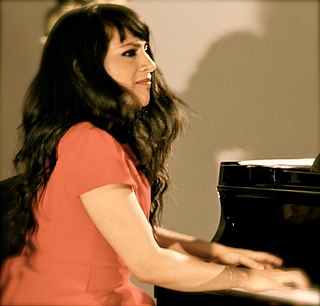Related Research Articles

Alfred George Deller, CBE, was an English singer and one of the main figures in popularising the return of the countertenor voice in Renaissance and Baroque music during the 20th century.

René Jacobs is a Belgian musician. He came to fame as a countertenor but in recent years has become renowned as a conductor of Baroque and early Classical opera.
The Gramophone Classical Music Awards, launched in 1977, are one of the most significant honours bestowed on recordings in the classical record industry. They are often viewed as equivalent to or surpassing the American Grammy award, and referred to as the Oscars for classical music. They are widely regarded as the most influential and prestigious classical music awards in the world. According to Matthew Owen, national sales manager for Harmonia Mundi USA, "ultimately it is the classical award, especially worldwide."

Richard Galliano is a French accordionist of Italian heritage.
Benjamin Bagby is an American singer, composer, harpist, and performer of medieval music.

Les Arts Florissants is a Baroque musical ensemble in residence at the Théâtre de Caen in Caen, France. The organization was founded by conductor William Christie in 1979. The ensemble derives its name from the 1685 opera Les Arts florissants by Marc-Antoine Charpentier. The organization consists of a chamber orchestra of period instruments and a small vocal ensemble. Current notable members include soprano Danielle de Niese and tenor Paul Agnew, who has served as assistant conductor since 2007. Jonathan Cohen is also on the conducting staff; Christie remains the organization's Artistic Director.
The Harp Consort is an international early music ensemble directed by Andrew Lawrence-King, specialising in Baroque opera, early dance-music, and historical World Music.
The Engelberg Codex is a music manuscript from the Benedictine abbey of Engelberg, Canton of Obwalden, Switzerland. One of the most important late-medieval liturgical manuscripts from Switzerland, the codex was compiled over an extended period of time and by several different scribes, as can be assessed from variations in colours of ink, types of script, note shapes and rubrics. In many instances the copying of the text preceded that of the music, though some scribes would alternate between individual syllables or words and the corresponding phrases of music. The Engelberg Codex contains early examples of German sacred song, an Easter drama, tropes, sequences and motets.

Bejun Mehta is an American countertenor. He has been awarded the Echo Klassik, the Gramophone Award, Le Diamant d’Opera Magazine, the Choc de Classica, the Traetta Prize, and been nominated for the Grammy Award, the Laurence Olivier Award, and the Preis der Deutschen Schallplattenkritik. Writing in the Süddeutsche Zeitung, Michael Stallknecht called him "arguably the best counter tenor in the world today."

Harmonia Mundi is an independent record label which specializes in classical music, jazz, and world music. It was founded in France in 1958 and is now a subsidiary of PIAS Entertainment Group.
Crawford Young is an American lutenist and musicologist residing in Basel, Switzerland.
The Diapason d'Or is a recommendation of outstanding (mostly) classical music recordings given by reviewers of Diapason magazine in France, broadly equivalent to "Editor's Choice", "Disc of the Month" in the British Gramophone magazine.

Deutsche Harmonia Mundi is a German classical music record label. It was founded by Rudolf Ruby and based in Freiburg, Breisgau. The company was acquired by BMG Music in 1992 and is now part of Sony Music Entertainment. Ruby had Alfred Krings of WDR assemble their own house orchestra Collegium Aureum, founded 1964, to perform early music, selecting as leader Franzjosef Maier.
The Huelgas Ensemble is a Belgian early music group formed by the Flemish conductor Paul Van Nevel in 1971. The group's performance and extensive discography focuses on Renaissance polyphony. The name of the ensemble refers to a manuscript of polyphonic music, the Codex Las Huelgas.

Shani Diluka is a pianist of Sri Lankan parents. She was among those to benefit from a programme initiated by Princess Grace of Monaco, which allowed talented children to receive special music lessons integrated into their normal schooling. She received the first prize in the Académie de Musique. She subsequently studied with Odile Poisson, a pupil of Pierre Sancan. Enrolled in the Conservatoire de Paris in 1997, she studied with Georges Pludermacher and François-Frédéric Guy and later with Marie-Françoise Bucquet, Nicholas Angelich and Bruno Rigutto.
Carolus Luython was a late composer of the "fifth generation" of the Franco-Flemish school.
La Petite Bande is a Belgium-based ensemble specialising in Baroque music played on period instruments. They are particularly known for their recordings of works by Corelli, Rameau, Handel, and Bach.
The Ensemble Clément Janequin is a French early music ensemble founded in 1978 and specializing in the chansons of the Renaissance and early Baroque.
Sébastien Daucé is a French conductor and musicologist, born in Rennes (France) on 4 June 1980. He is artistic director and founder of Ensemble Correspondances, formed from alumni of the Conservatoire National Supérieur de Musique de Lyon.
Les Siècles is a French philharmonic orchestra founded in 2003 by François-Xavier Roth, whose ambition is to put works from the 17th to today into perspective. The musicians of this orchestra play each repertoire on the appropriate historical instruments.
References
- ↑ The International Who's Who 2004 Europa Publications
- ↑ Anderson, Harmonia Mundia at 50, Early Music 2008, Oxford Journals.
- ↑ BERNARD COUTAZ Du disque au livre; trente ans d'édition. Impressions du Sud, 1987 p366
- ↑ Excerpt of 2009 Gramophone Awards article
- ↑ Gramophone August 1979 p.311
- ↑ "Deller discography at Emfaq". Archived from the original on 2011-12-03. Retrieved 2010-03-02.